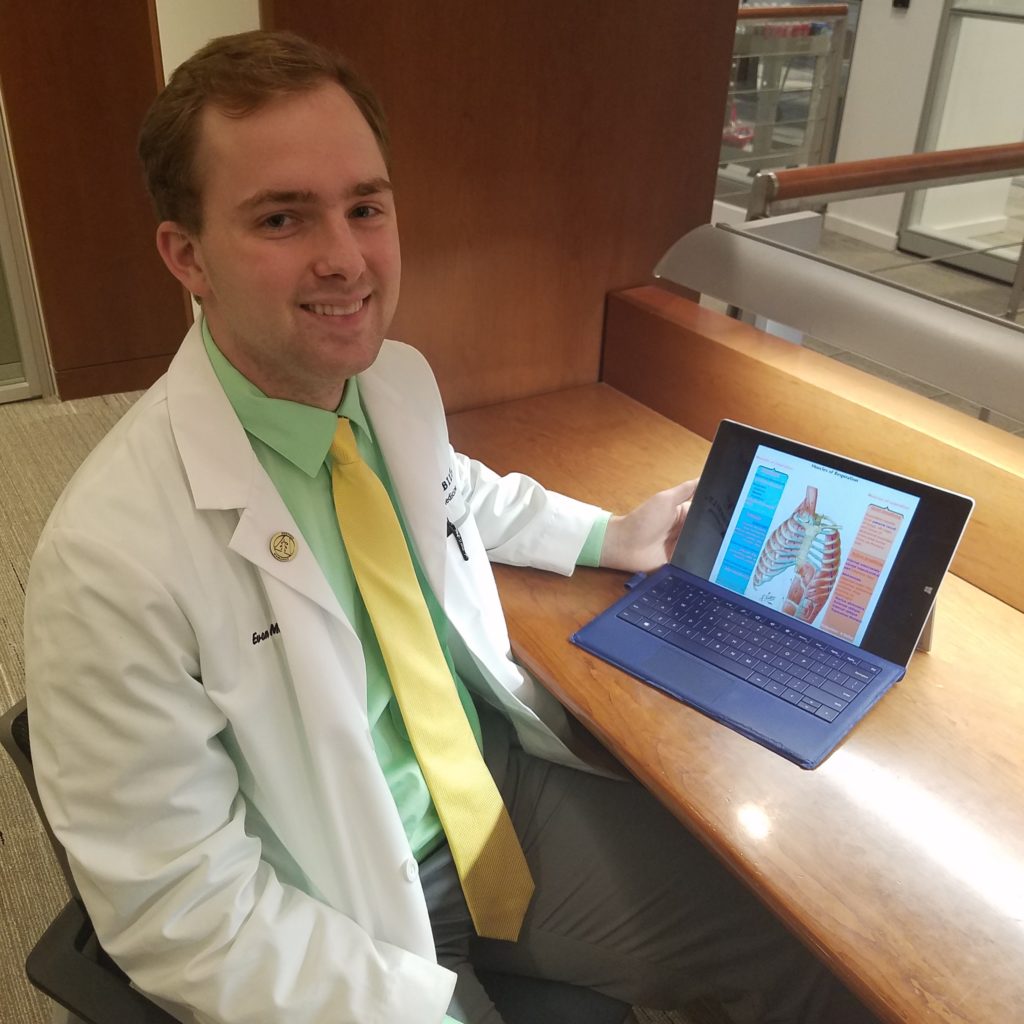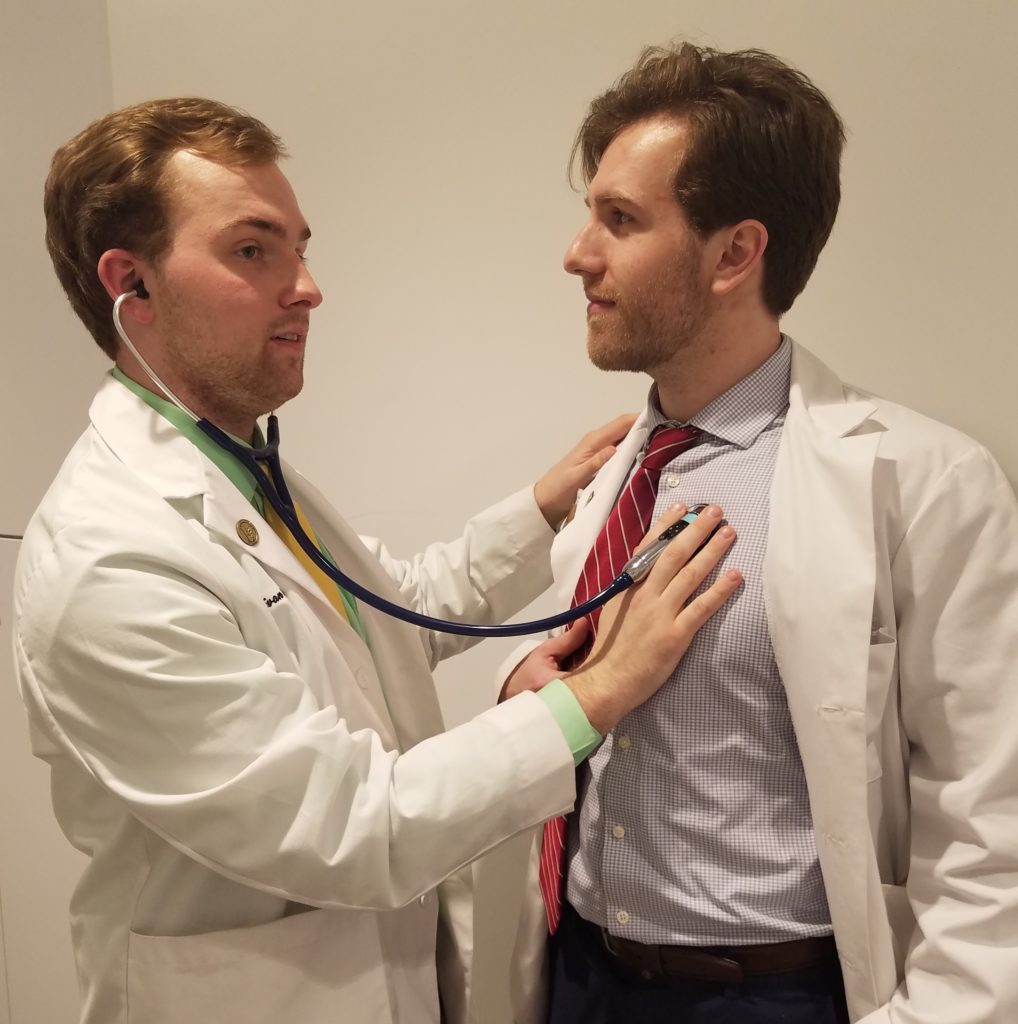A YEAR IN THE LIFE: ATTENDING MEDICAL SCHOOL WITH A DISABILITY

BY GRANT MERCER – More than 20% of Americans live with a disability. By comparison, fewer than 2% of doctors are disabled, with most acquiring their disability after medical school. Fewer still are medical students with physical or sensory disabilities – only 0.5%.
All medical schools have a set of technical standards detailing the cognitive and physical abilities expected of applicants. A 2016 study by the National Center for Biotechnology Information (NCBI) found that while schools keep the provisions of the American with Disabilities Act (ADA) in mind, they set their own specific technical standards as they see fit.
A University of Michigan study found that only a third of medical schools state outright that they would accommodate a student with a disability who was otherwise qualified to attend. Another half offered only vague details about who they would accept. The remaining 15% of schools provided no information at all about admission standards for the disabled. For many prospective medical students with disabilities, the dream of becoming a physician seems an impossibility as they check the admissions standards publicized by each school.
 Evan Mercer, who is in his first year at the Vanderbilt School of Medicine, is one of those students with a disability who made it into medical school. Here is his story.
Evan Mercer, who is in his first year at the Vanderbilt School of Medicine, is one of those students with a disability who made it into medical school. Here is his story.
EVAN’S DISABILITY
Evan has been deaf since birth. His hearing impairment was not discovered until his fourth birthday, leaving him far behind his peers in speech development. Because of this late diagnosis, specialists held little hope for his ability to be successful in the world of the hearing. Refusing to accept this outcome, his parents enrolled him in an oral-deaf school, a place where deaf children are taught to speak. After three years of eight-hours-a-day therapy, his first three-word sentence, “dog run yard”, came at age seven. In second grade, he was mainstreamed into a public school, always in classes alongside his hearing peers. Evan does not sign, but rather relies on his high-tech hearing aids to help him with sound recognition. He wears a hearing aid in one ear, but the other ear is considered a “dead ear”, beyond help from a hearing aid.
MEDICAL SCHOOL APPLICATION
During the medical school application process, Evan acknowledged his hearing loss. His personal statement spoke openly about both his struggles and his victories as a hearing-impaired person. As Evan noted, “while deafness is a big part of my life, it does not define me. It is nothing to be embarrassed about, nothing to be ashamed of. It’s just me. Why hide it?”
Knowing that schools might have concerns about a deaf person being able to handle the demands of a medical career, he took steps to demonstrate that his hearing loss would not be a problem. While he initially majored in Neuroscience, he added a Communications major to demonstrate his mastery of communication skills. To show that he would be able to speak to patients, he added links to two of his speeches, one at his high school graduation and another from a summer internship.
During his medical school interviews, a few interviewers did ask about his hearing loss, but it was never in a negative way. It was more of curiosity about how he managed to work through it. He answered all their questions openly and honestly.
ACCOMMODATIONS
Vanderbilt has readily provided Evan with his needed accommodations. First, he uses a Communication Access Real-time Translation (CART) system, often referred to as real-time captioning. Listening through the microphone on his laptop, a remotely located captioned, uses a court reporting stenography machine to display everything that is being said – word for word – on Evan’s computer. Not only the professor’s words but also any student’s comments will come across Evan’s screen, ensuring he does not miss anything being said. In addition, Evan uses a special electronic stethoscope which amplifies sounds at a much greater level than a standard stethoscope.
As an undergraduate, Evan used an FM system, a wireless system which uses radio waves to connect a microphone worn by the professor to a receiver in his hearing aids, but he does not use one now. His medical school professors use a microphone during lectures, enabling Evan to hear the lectures clearly. This benefits not only Evan but also all his hearing classmates.
While shadowing a surgeon this semester, Evan sometimes found it difficult to understand what was being said as the surgical masks impaired sound. Also, at times when the surgeries encountered difficulties, he noticed that people tended to lower their voices as they worked through the problem. To combat this, he started repeating what was being said to make sure he understood it. Whoever he was talking to – the attending, a resident, or a nurse – would correct him if he was wrong. As a side benefit, that also helped him with the pronunciations of complicated medical terms.
CLASSMATE REACTIONS
Evan’s classmates are very accepting of his disability. It helps that Evan makes light of his hearing loss. In Evan’s words, “It’s not a big deal to them because it’s not a big deal to me.” When classmates do comment on his hearing loss, it is usually to ask about the cause – not in a nosy manner, but in a way that friends do as they get to know each other.
Evan has become an informal social chairman, making a point of asking other students to go out to eat, take in an event, or simply hang out. He also has an arsenal of jokes (usually corny), often poking fun of himself and his bad ears. Many of the other medical students have never met a hearing-impaired person their own age before and if they had any reservations before, he puts them at ease.
PATIENT INTERACTION

Evan practicing his clinical skills on Ben Coiner, another first-year med student
Working with an ENT this past semester, Evan has met several patients, of all ages, who were newly diagnosed with hearing loss. Evan was able to use his own experiences to answer their questions and address their concerns. Parents of hearing-impaired children usually want to know about his school experiences: Will other children accept them? (Absolutely, but if they don’t, stay away from those kids – they’re rotten!) – Will they do well in their classes? (Yes, as long as they remember a disability is not an excuse to forego studying). Older patients want to know more about how hearing loss will impact their current way of life: Will driving be an issue? (Your driving will not be impacted, but you’ll still probably struggle with parallel parking). – How about talking on the phone? (No problem here, but hearing loss is a great excuse to get out of talking to that long-winded relative). – Are their TV-watching days over? (Captions are the way to go). Knowing that he has traveled the same road that they were about to (and not just survived but thrived) gives them comfort.
Next year, as a second-year student, Evan will have greater exposure to patients. He is not worried that patients will have qualms about his hearing loss, but rather will see him as any other second-year medical student. He feels that, for his able-bodied patients as well as those with a disability, “seeing a deaf doctor will help them understand that having a disability does not have to keep you from being successful – no matter what you do in life.”
NEXT UP: IS IT POSSIBLE TO HAVE A SOCIAL LIFE IN MEDICAL SCHOOL?
